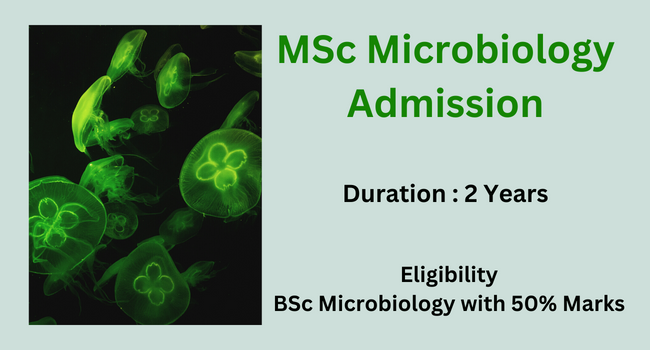MSc Microbiology Admission 2024: Master of Science in Microbiology admission has been started by various universities for the academic session 2024-25. MSc Microbiology is a two-year PG course in science. The eligibility criteria for this course is a BSc degree in a relevant stream with 50% marks. The average fee for all four semesters is around INR 28,000 to INR 71,000. In this course, students learn about living organisms and their interactions with the ecosystem. Candidates can apply online from the official portal of the universities.
MSc Microbiology Admission Latest Update
- University of Delhi, Delhi, presents an MSc Microbiology program. Eligibility: Bachelor’s degree in Science with Biology as a subject and 50% marks. Fees: ₹20,000 per year. Deadline: May 12, 2024. Visit http://www.du.ac.in/.
- IMTS Institute, Noida, provides an MSc Microbiology program. Eligibility: Bachelor’s degree in Science with Biology as a subject and 50% marks. Fees: ₹1,00,000 per year. Deadline: May 15, 2024. Visit https://www.imtsinstitute.com/.
- Savitribai Phule Pune University, Pune, delivers an MSc Microbiology program. Eligibility: Bachelor’s degree in Science with Biology as a subject and 50% marks. Fees: ₹30,000 per year. Deadline: 18 May 2024. Visit http://www.unipune.ac.in/.
- Shri Krishna University, Chhatarpur, offers an MSc Microbiology program. Eligibility: Bachelor’s degree in Science with Biology as a subject and 50% marks. Fees: ₹80,000 per year. Deadline: May 23, 2024. Visit https://www.sku.ac.in/.
MSc Microbiology Admission 2024 Highlights
| Full Form | Master of Science in Microbiology |
| About the Course | MSc Microbiology is a 2-year advanced postgraduate course that combines the disciplines of chemistry and biology. It studies the relationship of biology and chemistry with the environment and its ecosystem. |
| Duration | 2 years |
| Eligibility | BSc degree with a minimum of 50% or more from a recognized university in relevant disciplines like Botany, Zoology, Chemistry, Physiology, and Microbiology. |
| Examinations | IPU CET, BITSAT, CUET PG. |
| Fee | INR 28,000 to INR 71,000 |
| Approval | UGC/AICTE |
| Job Opportunities | Microbiologist, Clinical Research Associate, Research Analyst, Project Assistant, Nutritionist, etc. |
| Admission Process | Entrance Exam and Merit-Based |
| Subjects | Biostatistics and Computer Applications, Microbial Physiology, etc. |
| Distance Education | Approved |
| Admission Date | May 2024 |
| University | Singhania University, NILM University, IMTS Institute |
| Entrance Exam | May 2024 |
| Placement | Fortis, AIIMS, Industries like Biocon India, Dabur, Ranbaxy-Gurgaon, Five Star Hotels |
MSc Microbiology Admission 2024
MSc Microbiology Admission has started in many government or private universities or colleges. The application form is released for admission to MSc Microbiology for the session. The admission to MSc Microbiology basic eligibility, the candidate’s bachelor’s degree in BSc Microbiology with a minimum percentage of 50% marks eligible to get MSc Microbiology admission. The process for MSc Microbiology admission is confirmed after the verification of documents and payment of the first-semester fee alongside the admission fee.
Many universities conduct MSc Microbiology entrance exams for admission. University of Delhi conducts the Delhi University Entrance Test (DUET) for admission to the MSc Microbiology program. Savitribai Phule Pune University conducts the Savitribai Phule Pune University Entrance Test (SPPU-ET) for admission to the MSc Microbiology program.
MSc Microbiology Eligibility
Applicants who want to reserve a seat to pursue the MSc Microbiology program can apply at Presidency University, Savitribai Phule University, Panjab University, and more. The eligibility to get admission to the regular PG degree program is mentioned below.
- Candidates should pass the BSc Microbiology three-year undergraduate degree program with a minimum of 50% marks.
- The Reserved category gets a 5% relaxation in the required percentage.
- A BSc in microbiology or a related field is the prerequisite for applying to the MSc Microbiology program.
- For individuals wishing to enroll in this course at one of the many colleges in India, an entrance test is required.
M.Sc Microbiology Fees
The study of biostatistics, computer applications, microbial physiology, microbial genetics, enzyme technology, etc., is secured by the two-year postgraduate degree program in microbiology. In the UGC-approved institutes, MSc Microbiology costs for all four semesters range from INR 28,000 to INR 71,000.
MSc Microbiology Application Form
The MSc Microbiology course application form is released on the official portal or students get it from offline mode at the university campus. Students can submit their online application form through the website after filling it out in a proper manner.
Visit the official website of the selected university to access the application form. The online application form can be filled out after students meet the eligibility requirements. Forms must be filled out with the correct details and according to university instructions. It is necessary to submit the application form before the deadline.
Application Fee
It is ideal to submit the application form along with the application fee. The application fee for the microbiology program ranges from INR 250 to INR 850. Microbiology PG application fees can be deposited using an online banking card, demand draft, or mobile Internet banking.
MSc Microbiology Scope
This is the perfect course for those who have completed a bachelor’s degree in a relevant field. The students will be able to gain high-level skills in the subjects studied in this program. Following the program’s completion, there are excellent career opportunities in a variety of industries with competitive pay.
Students who have earned a PG degree in microbiology, such as an MSc, have the option of continuing on to a Ph.D. program. Students with a Ph.D. may have access to more career options, including lecturers and professors.
Top Areas of Employment After MSc Microbiology
- Lab Research
- Research and Development
- Agricultural Firms
- Academic Institutions
- Chemical Firms
- Operations Management
- Biotechnological Firms
MSc Microbiology Salary & Jobs
Candidates with an MSc in Microbiology degree can expect to start their careers with a salary package between INR 2,00,000 PA and INR 3,00,000 PA. The available job options for microbiology-based candidates are listed below.
- Medical Writer
- Chief Hygienist
- Microbiologist Auditor
- Operation Manager
- Lab Assistant
- Demonstrator
- Clinical Reviewer
- Microbiologist
- Data Analyst
- Research Analyst
- Medical Coder
Top Govt. Colleges for MSc Microbiology
Here is the list of top government colleges or Universities that offer MSc Microbiology admission to candidates:
- JC Bose University of Science & Technology, YMCA, Faridabad, Haryana
- Delhi University (DU)
Top MSc Specializations
Some Other Courses
Frequently Asked Questions?
Question 1: How did you come to choose M.Sc microbiology?
Ans: Medical advancements in understanding diseases will always be made possible by microbiology. Microbiology prepares me for a career in medical laboratory sciences.
Question 2: After my M.Sc in microbiology, what should I do?
Ans: There are various types of work for an M.Sc in microbiology some of them mentioned below:
- Research Associate.
- Food technologies
- Microbiologist.
- Pharmacologist.
- Biomedical scientist.
- Science writer.
- Ecologist.





